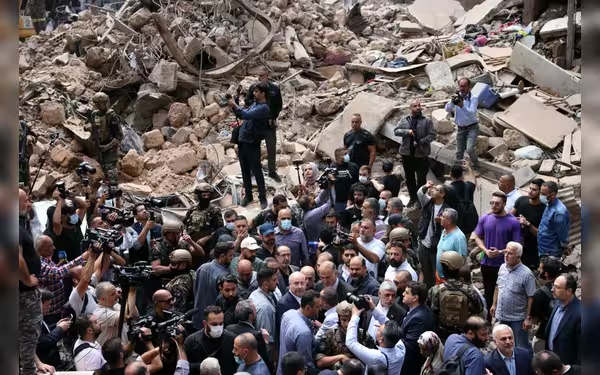Saturday, November 16, 2024 07:50 PM
Iran's Ghalibaf Visits Site of Deadly Israeli Airstrike in Beirut
- Iran's Ghalibaf condemns Israeli airstrike as 'crimes' against humanity.
- At least 22 casualties reported from the central Beirut airstrike.
- Lebanese PM calls for immediate ceasefire amid escalating violence.
 Image Credits: arabnewspk
Image Credits: arabnewspkIran's Ghalibaf visits Beirut airstrike site, condemning Israel's actions amid rising casualties and calls for a ceasefire.
In recent weeks, the conflict between Israel and Hezbollah has escalated, leading to significant casualties and international concern. The latest incident occurred in central Beirut, where an Israeli airstrike resulted in the deaths of at least 22 individuals. This strike has been described as the deadliest in the area in recent times, raising alarms about the ongoing violence in the region.
On Saturday, Iran’s parliament speaker, Mohammad Bagher Ghalibaf, visited the site of this tragic event. During his visit, he condemned Israel's actions, labeling them as "crimes" against humanity. Accompanied by two lawmakers from Hezbollah, Ghalibaf expressed his outrage, stating, "International organizations and the UN Security Council have the capability (to stop Israel) but they are unfortunately keeping silent." His remarks highlight a growing frustration with the perceived inaction of global bodies in the face of escalating violence.
The air raid, which took place on Thursday night in the densely populated Basta area, reportedly targeted Wafiq Safa, the security chief of Hezbollah, according to sources close to the group. However, neither the Israeli military nor Hezbollah has confirmed this claim, leaving many questions unanswered about the intentions behind the strike and the fate of the targeted individual.
During his visit, Ghalibaf also met with Lebanese Prime Minister Najib Mikati, who emphasized that his government’s priority is to work towards a ceasefire. Mikati has called on the United Nations to pass a resolution for an "immediate" ceasefire between Israel and Hezbollah, reflecting the urgent need for de-escalation in the region.
Ghalibaf's visit to Lebanon is part of a broader diplomatic effort by Iran to support its allies in the region. Just a week prior, Iran’s Foreign Minister Abbas Araghchi expressed his country’s commitment to a simultaneous ceasefire in both Gaza and Lebanon, indicating Iran's strategic interest in stabilizing the area.
The situation remains tense, and the international community watches closely as events unfold. The ongoing violence not only affects those directly involved but also has far-reaching implications for regional stability and global peace. As discussions for a ceasefire continue, the hope is that diplomatic efforts will prevail, leading to a resolution that prioritizes the safety and well-being of civilians caught in the crossfire.













